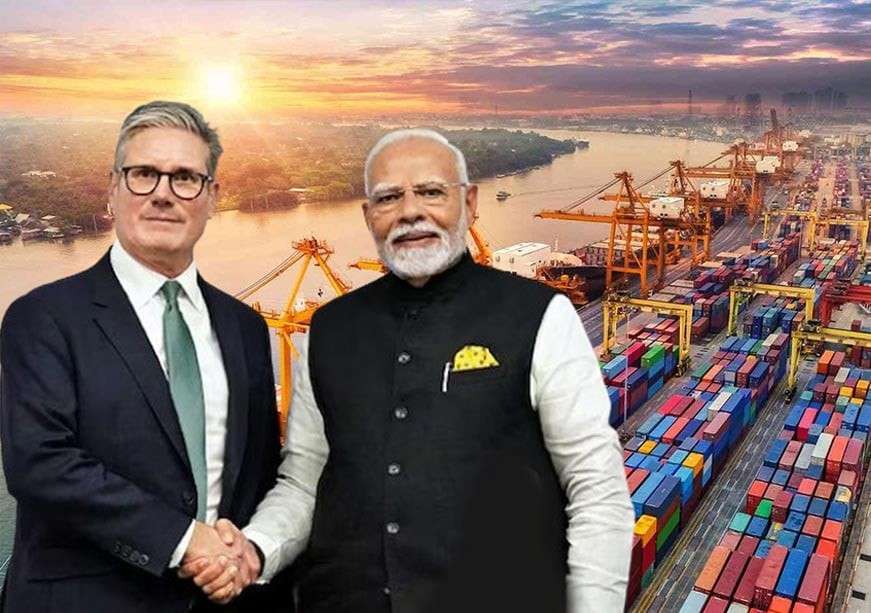The India-UK Free Trade Agreement (FTA) is a major trade deal that was years in the making. Negotiations began in January 2022 under then-UK Prime Minister Boris Johnson, who had aimed to finish the talks by Diwali that year. However, after multiple delays, the deal was finally concluded in May 2025, with Prime Minister Modi calling it a “historic deal.”
A long-awaited Free Trade Agreement 2025 (FTA) between India – United Kingdom on Thursday during Prime Minister Narendra Modi’s visit to London, marking a significant milestone for global trade and diplomacy. Following almost three years of discussions, this ambitious agreement marks a sea change in the two countries’ strategic and economic partnership. With the FTA Agreement, which both sides have hailed as “historic” and “transformative,” tariffs on 90% of UK tariff lines will be eliminated, and tariffs on 99% of Indian tariff lines will be reduced, covering almost 100% of the value of bilateral commerce. By strengthening its economic ties with one of the world’s fastest-growing economies, the UK furthers its post-Brexit “Global Britain” vision, while India gains unparalleled access to a significant Western market.
The UK After Brexit: Navigating India’s Rise
India UK Free Trade Agreement 2025 is a significant step in its quest for partners outside of the EU. The agreement was referred to as a “blueprint for a new era of cooperation” by Prime Minister Keir Starmer, who welcomed Indian Prime Minister Modi at 10 Downing Street. The agreement significantly lowers tariffs on British exports, such as liquor, automobiles, medical devices, and aerospace components. To increase the competitiveness of the UK’s iconic spirits in the Indian market, for example, the existing 150% taxes on Scotch whisky and gin will be dropped to 75% immediately and then progressively reduced to 40% over the next ten years. Automobiles will see a dramatic cut in duties from 100% to just 10% through a tariff rate quota system boosting the prospects for brands like Jaguar Land Rover and Aston Martin. Similarly, British manufacturers in machinery, advanced manufacturing, and clean energy will benefit from expanded access to the Indian market. By 2040, the FTA is projected to add £4.8 billion (US$6.4 billion) annually to the UK economy and increase exports to India by 69%, solidifying London’s long-term economic footprint in South Asia.
India’s Big Win: Market Access, Jobs, and Investments
The agreement represents a significant victory for India in terms of trade Liberalization. The FTA exempts nearly all Indian exports to the UK benefiting labor-intensive businesses such as textiles, leather, marine products, footwear, toys, sports goods, gems and Jewellery, engineering goods, auto components, and organic chemicals. This will open up massive new markets for Indian manufacturers, in line with New Delhi’s emphasis on job creation and export-led growth. The agreement has significant implications for India’s services sector, including commitments in IT, finance, education, and professional services. It facilitates the migration of Indian professionals in all sectors to enter the UK economy.
Strategic Implications: More than a Trade Deal
This agreement is about more than simply economical; it is also about positioning. It is a clear step in the UK’s post-Brexit “Indo-Pacific tilt,” reducing its reliance on China and firmly establishing Britain’s place in South Asia’s growth story. For India, it’s an opportunity to increase its position in global trade and acquire greater clout in negotiations with major players like the EU and the United States. Like recent deals with EFTA, ASEAN, and Australia, it fits into India’s larger ambition to develop a resilient, varied trading network. Besides the financial aspect, it serves as a bridge between people, strengthening cultural and professional relationships with the United Kingdom, which has one of the world’s largest Indian diaspora populations.
Blueprint for the Future:
The India–UK Free Trade Agreement (FTA) of 2025 is a transformative deal that strengthens since the economically, it grows bilateral trade seen with zero tariffs on the vast majority of Indian exports and tariff reductions on UK goods, encouraging growth in key sectors in textiles, pharmaceuticals/biotechnology, information technology-related, clean energy. In addition, the FTA consolidates heightened levels of professional mobility, investment, and innovative institutions. Geopolitically, it deepens a shared vision on the construction of a new order to counter-balance shifting global powers, reduces reliance on China, increases cooperation on technology, climate action, and security, and finally, provides both countries an opportunity to serve as one influential player among the nation states across the global stage. In all, the FTA remains an opportunity for a brighter future based upon mutual economic development/ever-growing prosperity underlined by strategic cognancy and consistency based upon shared interests/values and a deeper multicultural partnership that weathers periodic challenges in our pursuit of advancing economic diplomacy and political geopolitics/uninhibited regional stability/global order.
.FAQs on the India–UK Free Trade Agreement 2025
1. What is the India–UK Free Trade Agreement (FTA) 2025?
The India–UK FTA 2025 is a comprehensive trade pact that eliminates or reduces tariffs on nearly all goods exchanged between the two nations, enhancing trade, investments, and professional mobility.
2. How will the FTA benefit India and the UK?
India gains expanded access for its exports in sectors like textiles, gems, IT, and engineering, while the UK benefits from reduced tariffs on automobiles, liquor, machinery, and other key exports, boosting bilateral trade and economic growth.
3. Why is the India–UK FTA strategically important?
Beyond trade, the FTA strengthens India–UK strategic relations, supports the UK’s post-Brexit “Global Britain” vision, diversifies India’s trade partnerships, and enhances cooperation in technology, climate, and security.

